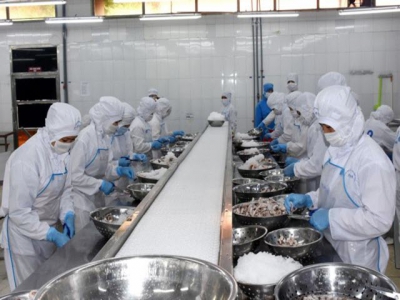Seafood processing companies lacks skilled labourers

BÀ RỊA - VŨNG TÀU — Seafood processing enterprises in the southern province of Bà Rịa-Vũng Tàu are facing a serious shortage of skilled labourers, affecting their production and exports.
Bà Rịa-Vũng Tàu Province’s seafood processing enterprises face a labour shortage. — VNA/VNS Photo Hoàng Nhị
Although many workers have been offered more attractive employment terms since the beginning of the year, the shortage has worsened.
Of 900 seafood processing enterprises in the province, about 60 per cent of them need an additional 7,000 employees.
The figure could be even higher since some companies have not registered with the province's employment service centre.
At processing factories, workers face cold and wet working environments, with unpleasant odours.
They often take the job temporarily until they find something better.
The presence of industrial parks and other industries in the province has also created a more competitive job environment.
Seafood processor Thế Phú Co. Ltd in Vũng Tàu City, for example, is in need of about 1,000 new workers to expand its production, but it has only filled 25 per cent of the jobs.
The company has nearly 300 employees, with 90 per cent of them temporary workers who often leave at different times.
To ensure that signed export contracts are fulfilled, the company has spent a lot of money to pay workers overtime.
Despite offering free accommodation and transportation, extra bonuses and mid-shift meals, many workers have left for other jobs.
Vũ Xuân Đức, head of the quality management department at Thế Phú Co. Ltd, said most of the company’s workers lived in rural areas in the province.
“When the crop season comes, they often return home to help at the farm,” he said. Many of the workers are reluctant to sign long-term contracts.
The Bà Rịa Vũng Tàu Seafood Processing, Import and Export Joint-Stock Company (Baseafood) employs 300-400 skilled workers to ensure its export volume of 200 tonnes of finished products per month.
The company currently has a shortage of 150 employees, mainly skilled workers.
Many job applicants lack skills and professionalism, while most of the company’s employees are low-skilled or unskilled workers.
To improve their skills and meet the demand for higher quality products, the company has to spend time training workers.
Đỗ Đình Hải, head of Job Introduction Office under the province’s Employment Service Centre, said that seafood processing companies were being affected by changing job structures. “Workers tend to switch to other industries for a higher income,” he said.
The seafood processing sector employs mostly migrant workers, but the number in this category has decreased.
Some companies have built processing factories in rural areas to find workers.
“Seafood processing enterprises should develop policies to support workers so they will stay a long time and give them training to improve their skills,” Hải said.
Responsible agencies should also ensure a more balanced labour supply and demand by disseminating information about the labour market, he said.
Related news
Tools

Phối trộn thức ăn chăn nuôi

Pha dung dịch thủy canh

Định mức cho tôm ăn

Phối trộn phân bón NPK

Xác định tỷ lệ tôm sống

Chuyển đổi đơn vị phân bón

Xác định công suất sục khí

Chuyển đổi đơn vị tôm

Tính diện tích nhà kính

Tính thể tích ao



 Ca Mau eyes growth with special focus on…
Ca Mau eyes growth with special focus on…  Japan to fund aqua projects in Lao
Japan to fund aqua projects in Lao